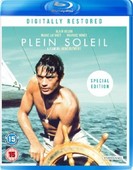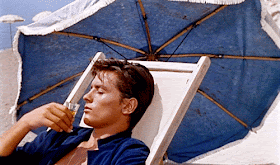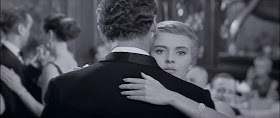 |
| Mayniel, Brialy, Blain - LES COUSINS |
 |
| Brialy, Lafont, Blain - LE BEAU SERGE |
1959 continues to fascinate and reveal more riches - a pivotal year, being the end of the 1950s and just as the '60s dawned. This was really my era, being 13 then and totally into movies. 1957-1963 was that great time for cinema and happily co-incided with my teenage years and cinema-going, devouring magazines like "Films and Filming" and the various fan mags, before I arrived in London aged 18 in 1964.
We have written on 1959 quite a bit here, as per label, the big American films (from NORTH BY NORTHWEST to ANATOMY OF A MURDER, via BEN HUR, SOME LIKE IT HOT, A SUMMER PLACE, THE BEST OF EVERYTHING, THE NUN'S STORY etc), to European films like EYES WITHOUT A FACE and LA LOI (French label), and the fascinating British films of the time. Now though I have finally got those two early Chabrols LE BEAU SERGE and LES COUSINS, which I had not seen since my teenage years - I should find a lot more in them now. We have been on a Chabrol jag lately, with his early items like A DOUBLE TOUR and the stunning LES GODELUREAUX and the delicious MARIE CHANTAL from 1965 (as below), and we have also seen a lot of his great era movies at the time (LE FEMME INFIDELE, LE BOUCHER etc) and have those 2 boxsets, including ROUTE TO CORINTH, INNOCENTS WITH DIRTY HANDS, and also his later LE CEREMONIE - a must see soon.
LE BEAU SERGE was Chabrol's first feature in 1958, with the duo of Jean-Claude Brialy and Gerard Blain, with Bernadette Lafont. LES COUSINS followed in 1959 which reverses the guys roles - and Juliette Mayniel is the girl, with those stunning eyes of hers (she also played one of the victims in EYES WITHOUT A FACE that year...).
Francois comes back to his home village in France after more than a
decade. He notices that the village hasn't changed much, but the people
have, especially his old friend Serge who has become a drunkard.
Francois now tries to find out what happened to him and tries to help
him.
 Charles is a young provincial coming up to Paris to study law. He shares
his cousin Paul's flat. Paul is a kind of decadent boy, a disillusioned
pleasure-seeker, always dragging along with other idlers, while Charles
is a plodding, naive and honest guy. He fell in love with Florence, one
of Paul's acquaintances. But how will Paul react to that attempt to
build a real love relationship ?
One of the major New Wave films. Its a variation on the fable by Fontaine on the town rat and the country mouse ... and the grassopper who flits between them ... its a great Paris film too.
Charles is a young provincial coming up to Paris to study law. He shares
his cousin Paul's flat. Paul is a kind of decadent boy, a disillusioned
pleasure-seeker, always dragging along with other idlers, while Charles
is a plodding, naive and honest guy. He fell in love with Florence, one
of Paul's acquaintances. But how will Paul react to that attempt to
build a real love relationship ?
One of the major New Wave films. Its a variation on the fable by Fontaine on the town rat and the country mouse ... and the grassopper who flits between them ... its a great Paris film too.
 We will return to these two in more detail, but for now they suggest how cool movies were becoming in 1959, leading up to those great years 1960, '61 and '62 ... when French and Italian and British cinema was leading the way, as the new American cinema was taking off too ...Also in 1959 Rene Clement was filming PLEIN SOLEIL (with that other trio of Deon, Laforet, Ronet), Bolognini was directing LA NOTTE BRAVA with Brialy again and that great cast (Terzieff, Martinelli, Milian) playing Pasolini's script of hoodlums and prostitutes (below); while Antonioni was on that island creating L'AVVENTURA ... while Fellini was going to stun us with LA DOLCE VITA ...I also liked Mocky's New Wavey LES DRAGUEURS, more Paris by night in 1959, where Truffaut was filming THE 400 BLOWS, after Malle's LIFT TO THE SCAFFOLD in '58 (as per French, Italian, Paris, Malle, Chabrol labels). Russia too was having its New Wave with hits like BALLAD OF A SOLDIER and THE LETTER THAT WAS SENT, while the Brazilian BLACK ORPHEUS was a revelation - more on that soon.
We will return to these two in more detail, but for now they suggest how cool movies were becoming in 1959, leading up to those great years 1960, '61 and '62 ... when French and Italian and British cinema was leading the way, as the new American cinema was taking off too ...Also in 1959 Rene Clement was filming PLEIN SOLEIL (with that other trio of Deon, Laforet, Ronet), Bolognini was directing LA NOTTE BRAVA with Brialy again and that great cast (Terzieff, Martinelli, Milian) playing Pasolini's script of hoodlums and prostitutes (below); while Antonioni was on that island creating L'AVVENTURA ... while Fellini was going to stun us with LA DOLCE VITA ...I also liked Mocky's New Wavey LES DRAGUEURS, more Paris by night in 1959, where Truffaut was filming THE 400 BLOWS, after Malle's LIFT TO THE SCAFFOLD in '58 (as per French, Italian, Paris, Malle, Chabrol labels). Russia too was having its New Wave with hits like BALLAD OF A SOLDIER and THE LETTER THAT WAS SENT, while the Brazilian BLACK ORPHEUS was a revelation - more on that soon.
 |
| Ronet, Laforet, Delon - PLEIN SOLEIL |
 |
| Brialy, Milian, Terzieff - LA NOTTE BRAVA |
 |
| BALLAD OF A SOLDIER |
 Both PLEIN SOLEIL and BONJOUR TRISTESSE have been re-released and are back in selected specialist cinemas - seek them out if you are in London - and want to weekend in Italy or the South of France; alternatively, put the dvds on! (PLEIN SOLEIL - see THE TALENTED MR RIPLEY book, post below - is of course a perennial favourite of mine: it opened my eyes to art and beauty and Europe when I was 14 - will be out too on a restored Blu-Ray - different from the Criterion American one. I will have that next week ...).
Both PLEIN SOLEIL and BONJOUR TRISTESSE have been re-released and are back in selected specialist cinemas - seek them out if you are in London - and want to weekend in Italy or the South of France; alternatively, put the dvds on! (PLEIN SOLEIL - see THE TALENTED MR RIPLEY book, post below - is of course a perennial favourite of mine: it opened my eyes to art and beauty and Europe when I was 14 - will be out too on a restored Blu-Ray - different from the Criterion American one. I will have that next week ...).














































